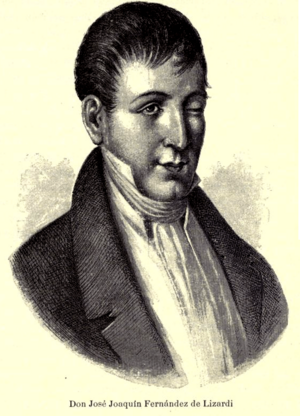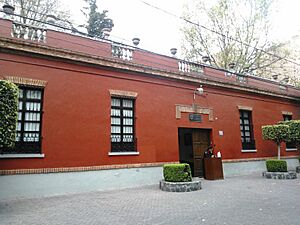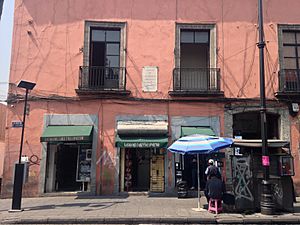José Joaquín Fernández de Lizardi facts for kids
Quick facts for kids
José Joaquín Fernández de Lizardi
|
|
|---|---|
 |
|
| Born | November 15, 1776 Mexico City (New Spain) |
| Died | June 21, 1827 Mexico City |
| Occupation | Writer |
José Joaquín Fernández de Lizardi (born November 15, 1776 – died June 21, 1827) was a famous Mexican writer and journalist. He is best known for writing El Periquillo Sarniento (1816). This book is often called The Mangy Parrot in English. Many people believe it was the very first novel ever written in Latin America.
Contents
Early Life and Family
Lizardi, as he was commonly known, was born in Mexico City. At that time, Mexico City was the capital of New Spain, a colony ruled by Spain. His father, Manuel Fernández Lizalde, was a doctor in Mexico City. He also wrote to earn extra money for the family.
Lizardi's mother, Bárbara Gutiérrez, came from a family that was not rich but was respected. Her father had been a bookseller in the nearby city of Puebla.
Education and Marriage
In 1798, Lizardi's father passed away after a short illness. This meant Lizardi had to stop his studies at the Colegio de San Ildefonso. He then started working for the government as a minor judge in the Taxco-Acapulco area.
In 1805, he married María Dolores Orendain in Taxco. As his family grew, Lizardi needed more money. So, like his father, he started writing to earn extra income.
Writing Career and Politics
Lizardi began his writing career in 1809. He published a poem praising Ferdinand VII, the King of Spain. At this time, Spain was invaded by Napoleon's army. Napoleon's brother-in-law took over the Spanish throne. Supporting the rightful king was seen as a patriotic act for Mexican thinkers. This also fit with Lizardi's early ideas about Mexican identity.
The Mexican War of Independence
In November 1810, the Mexican War of Independence began. Rebel forces led by Morelos entered Taxco. Lizardi was in charge of the local government there. He tried to protect the city and its people. He gave the city's weapons to the rebels but also told the Spanish ruler, Francisco Javier Venegas, about the rebel movements.
Lizardi believed in the rebels' ideas for reform. However, he was against war and bloodshed. By peacefully giving Taxco to the rebels, he hoped to save lives. After the Spanish forces took Taxco back in January 1811, Lizardi was arrested. He was sent to Mexico City as a rebel supporter. He successfully argued that he only acted to protect Taxco's citizens. The Spanish ruler freed him.
Journalism and El Pensador Mexicano
After being freed, Lizardi had lost his job and belongings. He became a full-time writer and publisher to support his family. He published many short, satirical poems in newspapers and pamphlets.
On October 5, 1812, Mexico gained some freedom of the press. Lizardi quickly started one of the first independent newspapers in the country. The first issue of his paper, El Pensador Mexicano ("The Mexican Thinker"), came out just four days later. He even used "The Mexican Thinker" as his own pen name.
In his newspaper, Lizardi wrote about the political issues of the day. He criticized the Spanish government's harsh rule. He supported the ideas of freedom and democracy coming from Spain. His articles showed the influence of Enlightenment thinkers like Voltaire and Rousseau. Reading their forbidden books was risky at the time.
In December 1812, Lizardi directly criticized the Spanish ruler, Francisco Javier Venegas. This led to his arrest. He continued to publish his paper from jail. However, he had to be careful not to upset the authorities too much. When a new ruler, Félix María Calleja, took over in March 1813, Lizardi praised him. The new ruler then freed Lizardi after seven months in jail.
Turning to Novels
Lizardi kept writing and publishing after his release. But the Spanish government and the Inquisition (a religious court) watched him closely. In 1814, freedom of the press was taken away again. So, Lizardi switched from journalism to writing novels to share his social criticisms.
This is when he wrote El Periquillo Sarniento. It is known as the first novel by a Mexican writer and the first Latin American novel.
El Periquillo Sarniento was published in weekly chapters throughout 1816. It included many comments on Mexico's political and moral situation. The first three volumes were published without problems. However, Lizardi's strong criticism of slavery in the fourth volume caused the publication to be stopped. The last sixteen chapters were only published in 1830-1831, after Lizardi's death and after Mexico became independent.
Lizardi also wrote other novels during this time:
- Fábulas (a collection of fables, 1817)
- Noches tristes (a novel, 1818)
- La Quijotita y su prima (a novel, 1818–1819)
- Don Catrín de la Fachenda (finished in 1820, published in 1832)
Later Years and Death
When the liberal Spanish constitution was brought back in 1820, Lizardi returned to journalism. But he continued to face attacks, arrests, and censorship from different political groups. Spanish loyalists opposed him until Mexico gained independence in 1821. After independence, people who wanted a strong central government attacked him because he favored a federal system. He also faced criticism from the Catholic Church.
Lizardi died from tuberculosis in 1827 when he was 50 years old. His family was very poor, so he was buried in an unmarked grave. He had hoped for an epitaph on his tombstone that said: "Here lie the ashes of the Mexican Thinker, who did the best he could for his country."
See also
 In Spanish: José Joaquín Eugenio Fernández de Lizardi Gutiérrez para niños
In Spanish: José Joaquín Eugenio Fernández de Lizardi Gutiérrez para niños
 | James B. Knighten |
 | Azellia White |
 | Willa Brown |



